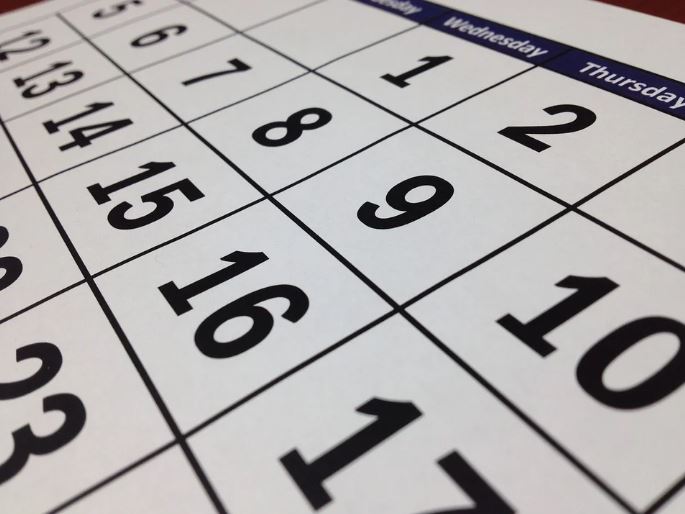What are the days of the week in German with articles and Pronunciation?
Topics
- Introduction
- Common vocabulary
- What are the days of the week in German with articles and Pronunciation?
- Meaning of the different days of the week
- What’s the first day of the week in Germany?
- German abbreviations for the days of the week
German Vocabulary List: How do you say the days of the week in German?
So you’re a random dude in Germany (let’s just say you’re called John Wick )… you are in class, happily listening away and suddenly your German professor says, “John Wick, we are going to have an examination on Monday! ” OH NO!!! The only problem is that he has said the sentence not in English but in German. You caught that there’s an exam as everyone is shocked. You do not know the names of the different days of the week in German! OH NO!!!! For once, John Wick is screwed!

More common scenarios are:
- You need to call your doctor and set up an appointment
- You need to visit your friend
- Your girlfriend says that she’ll marry you only if you know the days of the week ß OK FINE! This one is very unlikely or borderline impossible. If it happens, I’m a god for predicting this!
So I’m guessing by know, you know that you absolutely need to know the vocabulary of different days the week and you also need to pronounce them correctly. So in this lesson, we will learn about the seven days of the week in German and how to pronounce them.
What are the days of the week in German with articles?
In this section, we are will learn about the vocabulary for Monday to Sunday in German. We will also learn about the different associated vocabulary for days of the week. If you wanna get to even super basic German fluency, the word list for the different days of the week is a good point to start with.
| English | German | English Sentences | German Sentences |
| Monday | Der Montag | On Monday, I visited my friends. | Am Montag habe ich meine Freunde besucht. |
| Tuesday | Der Dienstag | I hate Tuesday. | Ich hasse Dienstag. |
| Wednesday | Der Mittwoch | Wednesday is a holiday | Mittwoch ist Feiertag |
| Thursday | Der Donnerstag | Thursday is the fourth day of the week. | Donnerstag ist der vierte Tag der Woche. |
| Friday | Der Freitag | I am getting married on Friday. | Ich heirate am Freitag. |
| Saturday | Der Samstag | We will go for a hike on Saturday. | Am Samstag machen wir eine Wanderung. |
| Sunday | Der Sonntag | I like to rest on Sunday. | Am Sonntag ruhe ich mich gerne aus. |
Other interesting Vocabulary lists
What day of the week is it?
Here’s another important set which will help you learn a lot about the day of the week in German. Basically it teaches about the order of the days of the week!
| English | German | English Sentences | German Sentences |
| Monday | Der Montag | Monday is the first day of the week. | Montag ist der erste Tag der Woche. |
| Tuesday | Der Dienstag | Tuesday is the second day of the week. | Dienstag ist der zweite Tag der Woche. |
| Wednesday | Der Mittwoch | Wednesday is the third day of the week. | Mittwoch ist der dritte Tag der Woche. |
| Thursday | Der Donnerstag | Thursday is the fourth day of the week. | Donnerstag ist der vierte Tag der Woche. |
| Friday | Der Freitag | Friday is the fifth day of the week. | Freitag ist der fünfte Tag der Woche. |
| Saturday | Der Samstag | Saturday is the sixth day of the week. | Samstag ist der sechste Tag der Woche. |
| Sunday | Der Sonntag | Sunday is the seventh day of the week. | Sonntag ist der siebte Tag der Woche. |
What are the common vocabulary related days of the week in German with articles?

In this section, we are will learn about the associated common German vocabulary for days of the week .
| English | German | English Sentences | German Sentences |
| The Days of the week | Die Tage der Woche | What day of the week is today? | Welcher Wochentag ist heute? |
| The Day | Der Tag | Monday is my favorite day. | Montag ist mein Lieblingstag. |
| The Week | Die Woche | This is the third week. | Dies ist die dritte Woche. |
| The Month | Der Monat | January is a month. | Januar ist ein Monat. |
| The Year | Das Jahr | She is three years old. | Sie ist drei Jahre alt. |
| The Weekday | Der Wochentag | Tuesday is a weekday | Dienstag ist ein Wochentag |
| The Weekend | Das Wochenende | On the Weekend, we are going to France. | Am Wochenende fahren wir nach Frankreich. |
| The Holiday | Der Urlaub | It is a Holiday on Christmas. | Es ist ein Feiertag an Weihnachten. |
| The day before yesterday | Vorgestern | Day before yesterday, I went to the zoo. | Vorgestern war ich im Zoo. |
| The Yesterday | Das Gestern | We met yesterday. | Wir haben uns gestern kennengelernt. |
| The Today | Das Heute | Today I will eat chicken. | Heute esse ich Hühnchen. |
| The Tomorrow | Das Morgen | Shall we meet tomorrow? | Sollen wir uns morgen treffen? |
| The Day after tomorrow | Übermorgen | Day after tomorrow, we have an examination. | Übermorgen haben wir eine Untersuchung. |
| The last week | Die letzte Woche | Did you see her last week? | Hast du sie letzte Woche gesehen? |
| The next week | Nächste Woche | I have an appointment next week. | Ich habe nächste Woche einen Termin. |
What is the Gender of days of the week ?
- In German, the days of the week are all masculine.
- So it’s der Montag… der Samstag.. der Freitag etc.
- This is thankfully very easy to remember as it is consistent across the 7 days of the week.
What is the pronunciation for days of the week in German with articles?
Now let us learn about the super core topic… learning to say things the right way or to put it into better terms, learning to pronounce the days of the week in german.

| English | German | Pronounciation |
| Monday | Montag | mohn-tahk |
| Tuesday | Dienstag | deens-tahk |
| Wednesday | Mittwoch | mit-vock |
| Thursday | Donnerstag | don-ers-tahk |
| Friday | Freitag | fry-tahk |
| Saturday | Samstag | zahms-tahk |
| Saturday in Northern and Eastern Germany | Sonnabend | zon-nah-bent |
| Sunday | Sonntag | zon-tahk |
| day | der Tag (-e) | dehr tahk |
| morning | der Morgen (-) | mawr-gun |
| afternoon | der Nachmittag (-e) | nakh-mih-tahk |
| evening | der Abend (-e) | ah-bunt |
| night | die Nacht (ä, -e) | nahkt |
| today | heute | hoy-tuh |
| tomorrow | morgen | mawr-gun |
| tonight | heute Abend | hoy-tuh ah-bunt |
| yesterday | gestern | geh-stairn |
| last night | gestern Abend | geh-stairn ah-bunt |
| week | die Woche (-n) | voh-kuh |
| weekend | das Wochenende (-n) | voh-ken-en-duh |
| daily | täglich | teh-glikh |
| weekly | wöchentlich | wer-khent-likh |
Some more Example sentences in German for days of the week with English translation
Let us go through some example sentences for days of the week in German with English translation!
- Ich gehe dienstags in die Klasse —————- I go to class on Tuesdays
- Von Mittwoch bis Freitag, bin ich in Paris —————- From Wednesday to Friday, I am in Paris
- Ich gehe am Sonntag um 10 Uhr zur Kirche. —————- I go to church on Sunday at 10 a.m.
- Am Montag beginnt die Arbeit wieder. —————- On Monday work starts again.
- Am Dienstag wird es kalt. —————- On Tuesday it will be cold.
- Wo wirst Du am Freitag sein? —————- Where will you be on Friday?
- Ich habe Urlaub von Mittwoch bis Sonnabend. —————- I will be on vacation from Wednesday to Saturday.
- Welchen Wochentag haben wir heute? —————- which day of the week do we have today?
- Welchen Tag haben wir heute? —————- Which day do we have today?
- Welcher Tag ist heute? —————- Which day is today?
- Ich habe am Dienstag Fleisch geessen. —————- I ate meat on Tuesday
- Von Montag bis Mittwoch, studiere ich Deutsch. —————- From Monday to Wednesday, I study German
Origin of words: Meaning of the Days of the week in German
Have you ever wondered why is it called Montag? Like what does Montag mean? Here in this section we will learn about the German origin of the different names of the days of the week.
Why is Monday called Montag in German?

- Montag which is the German translation for “Monday” comes from the German word Mond which means “the moon”.
- Therefore, Monday in German literally translates to “moon-day”.
- Basically Monday is dedicated to the moon.
Why is Tuesday called Dienstag in German?

- Dienstag which is the German translation for “Tuesday” comes from the ancient Germanic god Tyr.
- Tyr was the German god of war and the God of justice. Cool right???
- Dienstag is the day dedicated to Tyr
- Interestingly “Tuesday” is called Tuesday because of this!
Why is Wednesday called Mittwoch in German?

- The meaning of Mittwoch is “mid-week”.
- Mittwoch literally translates to mid-week.
- This is the only German weekday that doesn’t end in tag.
Why is Thursday called Donnerstag in German?

- In English, Thursday is Thorsday or THOR’S DAY!!!! Basically Thursday is dedicated to the Nordic god of Thunder and Lightning.
- In German, the legendary god Thor was called Donar
- So it is the same as English …. Donnerstag means Donars day or Thors day
Why is Friday called Freitag in German?

- The mythological goddess Frige was of Nordic origin and was the goddess of motherhood and marriage.
- The name literally translates to “to love”.
- So Friday or Freitag is dedicated to Frige, the goddess of Love.
What is the meaning of Samstag (or Saturday) in German?

- Samstag originates from the Greek word sambaton which is related to “Sabbath”.
- So Saturday is the day of the Sabbath
What is the meaning of Sonntag (or Sunday) in German?

- The most obvious one of the lot!! Sunday = the day dedicated to the sun.
- Sonntag or “Sunday” originates from the German word Sonne which means “sun”.
What’s the first day of the week in Germany?
- In Germany, the first day of the week is Monday.
- Days are counted from Monday until Sunday.
- In a few countries, days are counted from Sunday until Saturday. Basically it means that the week starts on Sunday as opposed to Monday in Germany or Austria or Switzerland.
- In Islamic nations, days are counted from Friday until Thursday.
Abbreviations for the days (Abkürzung für Wochentage)
Easy peasy… The abbreviation for days of the week is only the first two German alphabets. The English translation for abbreviation is “Abkürzung”
| English | German | Abbreviation |
| Monday | Montag | Mo |
| Tuesday | Dienstag | Di |
| Wednesday | Mittwoch | Mi |
| Thursday | Donnerstag | Do |
| Friday | Freitag | Fr |
| Saturday | Samstag | Sa |
| Sunday | Sonntag | So |
When to Capitalize?
- As a thumb rule, all nouns in German are capitalised.
- All days in German are nouns and hence must be capitalised.
- One exception to the rule is that if you’re not focussing on the day but on recurrence, you don’t capitalize.. confused? Lemme explain with an example!!!
- Say you’re saying “I eat meat on Tuesdays” or “ich esse dienstags Fleisch”
- The above example has dienstag in small but this is because it is having an extra “s” at the end (it is dienstags and not Dienstag)


